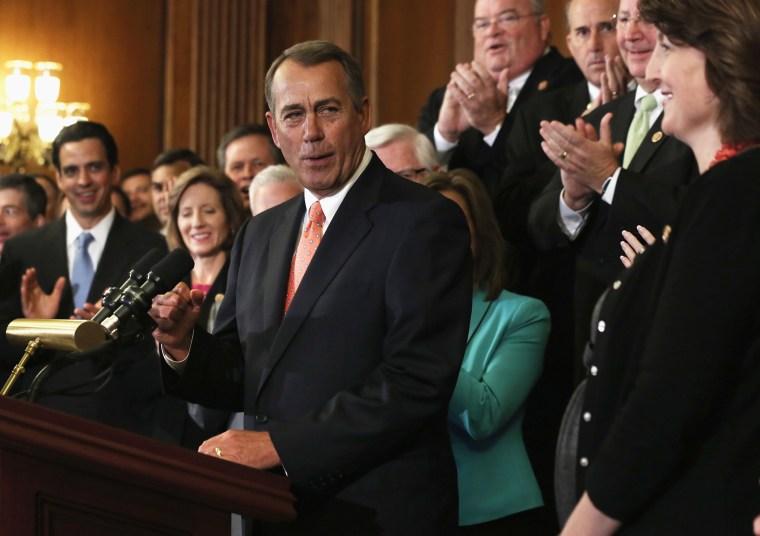House leaders are warning rank-and-file Republicans that the passage in December of the first comprehensive budget in years is unlikely to herald a return to even the once-routine task of passing all 12 of the spending bills that Congress is supposed to approve each year. And in a noted departure from previous end-of-session breaks, Republican leaders held no conference calls or large meetings in the long hiatus between adjourning on Dec. 13 and preparing to return on Tuesday. "Things are slow for sure," said one House Republican close to the party leadership. Expectations for the session are so low that lawmakers say early action on White House priorities like raising the minimum wage, restoring unemployment benefits that expired and overhauling immigration laws are likely to go nowhere. Instead, Congress is likely to focus on more prosaic tasks: finishing negotiations on a farm bill that has languished for two years, agreeing on a law authorizing water projects, passing a spending bill for the current fiscal year and raising the debt ceiling by March.
The 'Do-Nothing' Congress may yet do less
After three years of accomplishment-free governing, House Republican leaders have a plan for 2014: aim low, think small, and hope for the best.

About eight years ago, after the Gingrich-led Republicans shut down the government, the public backlash was so severe that GOP lawmakers were genuinely worried about reprisals at the ballot box. Their solution was quite sensible: they started working on noteworthy legislation, intended to be signed into law by then-President Clinton, so members of Congress would have some accomplishments they could run on in the 1996 elections.
Bob Dole, who gave up his Senate leadership role to take on Clinton, would later joke he wished Congress had done a little less -- the flurry of successes gave the president a boost, too.
With this in mind, it was only natural to wonder whether contemporary Republicans would follow a similar path going into the 2014 elections. They, too, shut down the government and might want to bolster their records with some boast-worthy accomplishments.
Except, they won't. The New York Times reports that the current "do nothing" Congress, which is on track to pass fewer bills than any in recorded American history, "is preparing to do even less." House Majority Leader Eric Cantor (R-Va.) is "quietly playing down expectations for any major legislative achievements in the final year of the 113th Congress" and has only scheduled 97 work days between now and the first Tuesday in November.
Keep in mind, passing a farm bill, extending the debt ceiling, and approving appropriations measures used to be routine, almost mundane governance -- it was literally the bare minimum Americans could expect from a Congress. Now, if we're lucky, lawmakers will get these measures done, and focus on little else.
In other words, it's been three years since Republicans took control of the House of Representatives, and since that time, Congress has no accomplishments of note (unless one considers a shutdown and two debt-ceiling hostage cries "accomplishments"). Looking ahead, GOP leaders have decided to keep this streak going another year, at least.
The electoral calculus is that inaction and failure is the key to success. Sure, Congress could be ambitious and rack up meaningful wins, but the fights would be contentious; the Republican base might not like the results; and the successful governance would probably give President Obama a boost in the polls, along with Congress.
The question for GOP leaders then becomes, "Why risk it?" They're likely to keep the House anyway thanks in part to gerrymandered district lines that help ensure victories, and if they just keep complaining about Americans gaining access to affordable health care, the base will be satisfied.
Best of all, if they keep expectations ridiculously low, no one will be disappointed by yet another year in which Congress does nothing.
"Big thinking has more often gotten us into trouble then led us to success," Rep. Tom Cole (R-Okla.) said.
Just think small, aim low, and hope for the best -- voters will probably just keep the status quo going indefinitely. How inspiring.